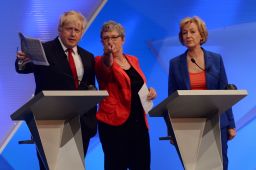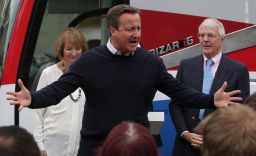Story highlights
Great Britain votes Thursday on whether to remain part of European Union or not
Slain lawmaker Jo Cox's legacy a "message of peace," Malala Yousafzai tells crowd at vigil
British politicians are making their crucial final pitches to a bitterly divided electorate Wednesday to persuade undecided voters of the merits of remaining in or leaving the European Union.
On the eve of the historic EU referendum Thursday, a decision that will shape the direction of country and its place in the world for decades, Britain is a nation divided.
Polls have consistently shown voters – a record 46.5 million of whom have registered – split down the middle, with the outcome too close to call.
The leading political parties and newspapers are similarly divided on the so-called Brexit, or British exit, from the 28-member union – an outcome that would be a huge blow to the European project.
French President Francois Hollande warned Wednesday that it was more than Britain’s future in the EU that hung in the balance, “it is the future of the European Union.”
“The departure of a country that is, geographically, historically, politically in the European Union would have extremely serious consequences,” he said. “It would also have extremely serious consequences for them, too.”
Britain’s wavering voters are likely to be the deciders of this momentous vote.
And with so much confusion generated throughout an acrimonious campaign – and many of the fundamentals of the debate in dispute by opposing camps – the outcome may come down to a question of gut instinct.
Why the Brexit vote is so close
‘Great Debate’ yields few answers
The “Leave” and “Remain” camps attempted to appeal to those instincts as they squared off Tuesday night for a fiery, two-hour televised “Great Debate,” billed as the final centerpiece of the campaign.
Amid a gladiatorial atmosphere before 6,000 in London’s Wembley Stadium, six speakers representing the opposing camps clashed on such core issues as whether leaving the EU would help or hurt Britain’s economy.
Leading “Leave” campaigner Boris Johnson, a member of Parliament and former London mayor, described the EU as “a job-destroying engine.”
“You can see it all across southern Europe and you can see it alas in this country as well,” he said, lambasting Brussels for imposing a “multitude of regulations” on British business.
Brexit: Europeans hope Britain will stay, but they’re not begging
By contrast, the “Remain” camp has argued that a vote to leave would do lasting harm to Britain’s economy.
The debate focused on familiar themes of security, sovereignty and immigration, with Johnson’s successor as London mayor, “Remain” advocate Sadiq Khan, accusing his opponents of “scaremongering” by raising the specter of Turkey joining the EU, potentially giving its citizens free movement within the union.
“Turkey is not set to join the EU,” he said, holding up a pro-“Leave” leaflet that highlighted Turkey’s proximity to war-torn Syria and Iraq. “You’re telling lies and you’re scaring people.”
Allies – from the United States to other members of the EU and NATO – are all in favor of Britain remaining in the union, Khan said.
“In fact, all of them are saying we’re safer together.”
Safer in or out of EU? Why security is key to Brexit vote

In turn, Johnson said it was the “Remain” camp that was guilty of drumming up fear, arguing that a Brexit offered “hope.”
“If we vote ‘Leave,’ we can take back our country,” he said to raucous applause. “This Thursday can be our country’s independence day.”
The “Leave” campaign has received more funding than its opponents, according to the latest figures from Britain’s Electoral Commission.
They showed that the pro-Brexit camp received just under £15.6 million ($22.9 million) in donations, while “Remain” got £11.9 million ($17.5 million) from February 1 to June 9.
Brexit: What will immigration look like if Britain leaves the EU?
Cameron’s final push
British Prime Minister David Cameron, who has led the “Remain” campaign, did not appear in the debate but instead made a televised pitch to voters outside 10 Downing Street hours earlier Tuesday.
He appealed directly to voters of his and older generations “to think about the hopes and dreams of your children and grandchildren” as they cast their votes.
He said that belonging to the EU was good for Britain’s economy, security and international standing, and warned that a Brexit would be irreversible.
Brexit: What does it mean for the U.S.?
Cameron repeated his message during an appearance Wednesday in Bristol alongside former Prime Minister John Major and then later at a rally in Birmingham.
“If we want the bigger economy and more jobs, we’re better if we do it together,” Cameron said in Bristol.
“If we want to fight climate change, we’re better if we do it together. If we want to win against the terrorists and keep our country safe, we’re better if we do it together.”

Major, Britain’s Prime Minister from 1990 to 1997, described the “Leave” camp as “gravediggers” of Britain’s prosperity.
“If our nation does vote to leave tomorrow, we must respect their decision,” he said.
“But if they vote to leave on the basis of half-truths and untruths, and misunderstandings, then pretty soon the gravediggers of our prosperity will have some very serious questions to answer – they will have to account for what they have said and done.”
In addition to the strategic implications of a Brexit for Britain, many observers predict it could trigger a political crisis, with Cameron struggling to remain in control of his ruling Conservative Party if he backed the losing side on such a critical issue.
Earlier this year, Cameron negotiated with European leaders to secure improved terms of membership in the bloc if Britain were to remain.
European Commission President Jean-Claude Juncker warned Wednesday that there could be no renegotiation.
“We have concluded the deal with the Prime Minister; he got the maximum he could receive, and we gave the maximum we could give so there will be no kind of renegotiation,” he said.
“Out is out.”
Why Brexit vote should worry Trump
Lawmaker reports death threat
The political climate leading up to the referendum has been unusually toxic, with both sides accusing the other of lying and making up their arguments.
How will nasty campaigns affect EU referendum?
Last week, the country was shocked by the killing of Labour’s Jo Cox, a pro-“Remain” advocate in her first term in Parliament, in her electorate in northern England. She was the first member of Parliament to be killed in office in 26 years.
Brendan Cox, her widower, told the BBC on Tuesday that she had worried before her death about politics becoming “too tribal and unthinking.”
“She was very worried that the language was coarsening and people were driven to take more extreme positions,” he said.
Jo Cox’s bereaved husband: She worried politics becoming too extreme
On Wednesday, crowds gathered in London’s Trafalgar Square to honor Cox on what would have been her 42nd birthday. Some waved signs reading #LoveLikeJo.
Nobel Peace Prize winner Malala Yousafzai told the crowd that “the name Jo Cox will carry on the message of peace.”
During the event, an airplane trailing a “Vote Leave” banner flew overhead, irritating some of those attending.
“They missed the memo that we have #moreincommon,” one Twitter user at the rally said.
Google’s UK homepage also contained a link in remembrance of Cox, which directed browsers to a post urging them to donate to her memorial fund.
The referendum campaign was suspended in the wake of her killing Thursday, and when activities resumed Sunday, many pundits predicted that politicians would attempt to strike a less divisive tone.
But ugly incidents have continued, with Labour politician and “Remain” advocate Yvette Cooper tweeting Wednesday that she had received a death threat to her and her family over her referendum campaigning.
She said she reported the threat, which came from a member of the public, to police and to Twitter.
“Time to stop the hatred,” she wrote.
Whatever the outcome of Thursday’s vote, the consequences of this bruising campaign are likely to be felt for some time.
In a speech Wednesday, UK Independence Party leader Nigel Farage, one of the highest-profile Brexit advocates, acknowledged the change in British politics the referendum had wrought.
“I have to say with some degree of pride, that without us this referendum would never, ever have happened. It is in many ways our referendum,” he said.
“I think we have changed the political agenda, and not just for the vote coming tomorrow, but I suspect we have changed it for the foreseeable future.”
CNN’s Phil Black, Nic Robertson, Richard Allen Greene, Simon Cullen, Sebastian Shukla, Tim Lister and Anais Furtade contributed to this report.



















